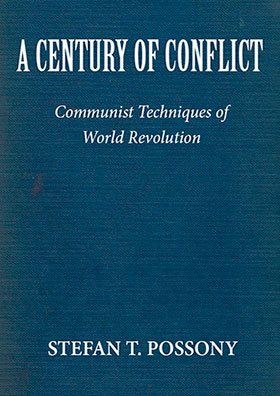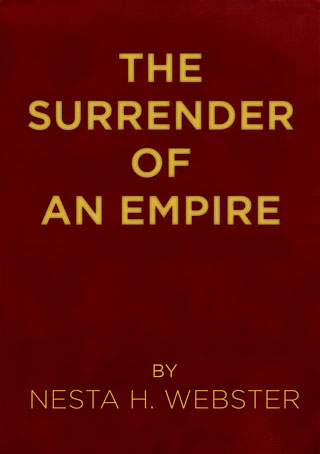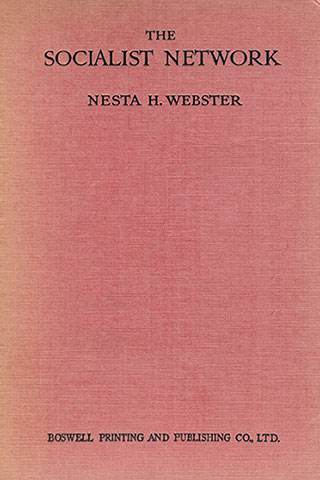Spiders or Flies?
Underground Networks in the U.S. Government
(New York: John Day Co., Jan 1954) 9,517 views
June 2, 2019

During the 1930’s and ’40’s an invisible web was spun over Washington. Its interlaced threads were extended to nearly every executive department and agency, to the military establishment, the White House itself, and to many of the committees of Congress. Through the records of the Congressional investigating committees and through the trials of Alger Hiss, the Communist leaders and the atom spies, part of the pattern of this web can now be traced. The existence of the web, and its general significance, are now, I think, beyond the doubt of any reasonable man who becomes acquainted with the evidence that has already been assembled.
It is the business of this book to summarize this evidence, and to fit its scattered pieces together. That task will be easier if we understand from the outset that the web over Washington is only one section of a giant web that stretches with one or another degree of tenacity over the entire earth. Its center is Moscow’s Kremlin. This world-wide web is, of course, simply one embodiment of the Soviet Communist world conspiracy.
In reality one should say that there are several interlacing webs, interlocked networks. They are part of the underground. They are field units of the secret, illegal apparatus of the Communist enterprise and the Soviet state.
 The Communist leaders have always stressed the necessity for illegal, underground activity. They have always insisted that it is more important than the legal, public activities of “open” Communists. “Legal work,” Lenin declared in an attack on the British socialist, Ramsay MacDonald, “must be combined with illegal work. The Bolsheviks always taught this. … The party which … does not carry on systematic, all-sided, illegal work in spite of the laws of the bourgeoisie and of the bourgeois parliaments, is a party of traitors and scoundrels.” In a document submitted to a Congress of the Communist International, and there adopted, he repeated: “The time has fully matured when it is absolutely necessary for every Communist Party systematically to combine legal with illegal work … legal with illegal organizations. …” The third of the Twenty-one Conditions of Admission to the Communist International is that a party must “create, parallel to its legal organization, a secret apparatus, capable of fulfilling, at the decisive moment, its duty to the Revolution.”
The Communist leaders have always stressed the necessity for illegal, underground activity. They have always insisted that it is more important than the legal, public activities of “open” Communists. “Legal work,” Lenin declared in an attack on the British socialist, Ramsay MacDonald, “must be combined with illegal work. The Bolsheviks always taught this. … The party which … does not carry on systematic, all-sided, illegal work in spite of the laws of the bourgeoisie and of the bourgeois parliaments, is a party of traitors and scoundrels.” In a document submitted to a Congress of the Communist International, and there adopted, he repeated: “The time has fully matured when it is absolutely necessary for every Communist Party systematically to combine legal with illegal work … legal with illegal organizations. …” The third of the Twenty-one Conditions of Admission to the Communist International is that a party must “create, parallel to its legal organization, a secret apparatus, capable of fulfilling, at the decisive moment, its duty to the Revolution.”
From the Communist point of view, in fact, open Communist activities are primarily an auxiliary and front for the underground—“a screen,” as Stalin expressed it, “behind which … illegal activities for the revolutionary preparation of the masses may be intensified.”
The Communists aim, through the underground, to infiltrate every region and level of society. In What Is To Be Done?, the basic work of the Communist doctrine, Lenin states that revolutionists “must go among all classes of the population, must despatch units of their army in all directions.” (Lenin’s italics.) We must, he says, “have ‘our own men’ everywhere, among all social strata, in all positions.”
The key target of infiltration is government, in all of its branches, civilian and military. This is the key target because the objective of the Communists is the destruction of all governments (except their own)—not capture, let it be stressed, but destruction. About this objective there is no confusion in Communist ranks. In order to establish Communist power, Stalin wrote, it is indispensable “to smash entirely the bourgeois state machinery and its old army, its bureaucratic officialdom and its police force.” This objective applies above all to the government of the United States, because the United States under its present form of government is now the only major obstacle faced by the Communists in the achievement of their final goal of world domination.
To say that the Communists aim at the destruction of all non-Communist governments is the same thing as to say that they aim at the triumph of the Soviet government. Therefore the web, the infiltrated networks, always operate to serve the interests of the Soviet Union. “A revolutionary,” in Stalin’s definition, “is he who without arguments, unconditionally, openly and honestly … is ready to defend and strengthen the USSR. … An internationalist is he who, unreservedly, without hesitation, without conditions, is ready to defend the USSR.”
Vishinsky, in 1948, made the problem of “loyalty” very plain:
At present the only determining criterion of revolutionary proletarian internationalism is: are you for or against the USSR, the motherland of the world proletariat? An internationalist is not one who verbally recognizes international solidarity or sympathizes with it. A real internationalist is one who brings his sympathy and recognition up to the point of practical and maximal help to the USSR in support and defense of the USSR by every means and in every possible form. … The defense of the USSR … is the holy duty of every honest man everywhere and not only of the citizens of the USSR.
Whoever has studied this quotation will need no further guide to the inner mystery of the Washington underground.
Moscow directs, then, the attempt at the secret infiltration of all agencies of the American government. In the expected revolutionary crisis of the future, the “final conflict” about which “The Internationale” sings, the plan is to draw the web tight, and to suffocate the government from within as part of the process of destroying it. Meanwhile, short of this longed-for consummation, the infiltrators are assigned their routine, day-by-day jobs. These run the whole range of political and psychological warfare. The chief of them can be listed in three groups:
(1) Intelligence or espionage—supplying significant information, including confidential information, to the Soviet intelligence services. Elizabeth Bentley and Whittaker Chambers were among the couriers who transmitted such intelligence from the Washington networks to direct Soviet representatives. The Rosenbergs are examples in the atomic field.
(2) Influencing government policies and activities in favor of Communist and Soviet interests. According to the testimony, this was continuously done by the Washington networks: as, for example, when they manipulated government labor machinery to the benefit of Communist-controlled unions, or pushed State Department and White House opinion toward the Morgenthau Plan or Tito (when he was still Stalin’s henchman), and away from Chiang Kai-shek.
(3) Undermining the administrative, physical and moral framework of the government, and acquiring “reserve” positions where this can be done on a large scale in time of emergency—war or revolution. The “undermining” activities vary from outright military sabotage to what might be called “administrative sabotage” in such documented instances as the lifting of papers from security files.
2
The structure of the web is complex. Its inhabitants occupy different locations within it, and differ also in their personalities, functions and motives. The web over Washington is spun and controlled in the Communist and Soviet interest, and therefore counter to the interests of the United States. The networks as a whole, “the apparatus,” serve the interests of Communism and the Soviet Union, and therefore injure the interests of the United States. But it does not follow that each inhabitant of the web, each member of the networks or agent of the apparatus, has one and the same legal, psychological and moral relationship to the whole. Who are the hunters, who the victims? Who are the spiders and who the flies?
Our concern, let us keep in mind, is not with open, professed Communists, but only with the underground—the illegal apparatus and the hidden, secret Communist agents and collaborators. Moreover, we are considering the underground only insofar as it operated within agencies of the U.S. government. (The Committee on Un-American Activities has suggested that the Communist enterprise can be “compared with a submarine with its small periscope exposed and its destructive apparatus beneath the surface.”)
The heads of the Soviet secret police—Yezhov, Yagoda, Beria—naturally have known what was being done, and why. So also have General Berzin and the other directors of Soviet Military Intelligence; Stalin and his Secretariat; the Politburo of the Russian Communist Party and the leaders of the international Party organization. Colonel Bykov, Golos, “Ulrich,” Markin, “Boris,” “Helen,” “Richard” and the other Soviet representatives to whom Whittaker Chambers, Elizabeth Bentley, Hede Massing and other couriers as yet unnamed turned over microfilms and documents, and from whom they took orders—they also have known. J. Peters, chief of the underground section of the American Party, knew, and Earl Browder, Secretary of the Party through the thirties and the war years.
But what of the others, the American citizens, the men and women, most of them obscure, who have composed the warp and woof of the web? Have they known just what they were doing? Do they realize that they place themselves in the service of a foreign power and of a world enterprise dedicated to the destruction of the American government and of free society? Do they understand clearly that by their actions they contribute to the success of an apparatus that steals thousands of secrets for transmission to a foreign power, and perverts the policies of the American government to the benefit of that power?
It is possible that some of them, individually, have not understood these truths. If so, this ignorance mitigates their legal and no doubt their moral guilt. Under our legal code, an individual is condemned only for actions that he intended, for which he can be deemed individually responsible. However that may be, it does not alter the objective, historical fact that all who collaborate in any measure with the underground, through ignorance or by design, from the best motives or the worst, in that same measure aid Soviet Communist interests and injure American interests.
How could anyone unintentionally commit espionage, you ask? Does that seem to you absurd? Think back a moment. Not infrequently you have been asked to post a letter for a friend or neighbor, have you not? Did you know what those letters contained, or in all cases why your friend did not choose to post it himself? Did a neighbor, leaving perhaps for a vacation, ever ask you to deliver a small message, verbal, written or even by telephone, to someone who might call? When you were about to take a trip across country, or better still to Europe or back from there, has someone you know ever asked you to deliver a note or small box, perhaps just post it from the other side?
In 1938 Whittaker Chambers left a small package with his wife’s nephew, Nathan Levine. Levine knew nothing of what was in it, and had forgotten its existence when ten years later Chambers came to get it back. Its contents were the microphotographs of secret documents that sent Alger Hiss to jail. [1] David Zablodowsky was head of the Publications Division of the United Nations Secretariat, with a salary of $14,000. Whittaker Chambers testified [2] that Zablodowsky had aided the Communist underground and the “Robinson-Rubens” ring that faked U.S. passports for the use of Soviet agents. Zablodowsky, in his sworn testimony,[3] denied that he had been a Communist, but admitted that he had “in a sense” aided the underground.
Senator Eastland. Did you take a message from Mr. Chambers to J. Peters?
Mr. Zablodowsky. Yes, or in any case I was passed on, I was introduced. Whether it was in the form of a message, I can’t say. …
Senator Eastland. What was the message that you took from Chambers to Peters?
Mr. Zablodowsky. I can’t say that it was a message or merely an introduction, that I was to await a call from him. The circumstances are vague to me. …
Senator Eastland. Did the call come?
Mr. Zablodowsky. Yes. …
Mr. Morris. Did you ever aid anybody who was conducting an illegal passport ring?
Mr. Zablodowsky. If I did, I did so unknowingly.
Senator Eastland. Well, did you?
Mr. Zablodowsky. Here is the circumstance, Senator. I actually did agree to transmit an envelope, a letter, to somebody who called for it. … I was told that a certain person would call with a certain name and I was to give it to him.
Senator Eastland. What was in the letter, do you know?
Mr. Zablodowsky. I haven’t any idea.
Senator Eastland. Did you give him the letter?
Mr. Zablodowsky. Yes, I did.
A number of those who aided the underground testified, as Zablodowsky further did, that they believed it to be merely some kind of secret group working against Hitler. Elizabeth Bentley, who was particularly interested in Italy, was originally allowed to believe, she says, that she was in touch with an organization that was helping victims of Italian fascism. Indeed, anti-fascist sentiment was used by the spiders as bait for their flies.
Mrs. [Hede] Massing. At the end of 1933 … on my way back from Moscow I met Ludwig in Paris and was assigned to the United States. …
Mr. Morris. What was your assignment in the United States?
Mrs. Massing. My assignment was not clearly defined in Paris. I was briefed by Ludwig to the effect, really ideology mostly. … He said, “You are going to a great country where there are many good people. You understand fascism. Bring the message of fascism to them and rally people behind the fight against fascism.”
Now that sounds rather vague for an espionage agent and I do want to emphasize that I am pretty sure that during the years between 1933 and 1935 many Americans have been solicited into the services [i.e., the Soviet espionage services] with this very idea, the fight against fascism. …
Mr. Morris. You say the Soviet organization capitalized on that feeling in order to create an atmosphere by which people would be drawn in their orbit?
Mrs. Massing. Yes. … These are slow processes, because, you see, you must understand that a person who does not willingly want to be an agent will have a resistance to recognize his own function. He will rationalize. …[4]
Individual innocence is, then, possible. That is not the problem with which this book deals. Innocence is possible, but there is some reason to doubt that so very many of the lambs in our flock are totally white. Of those scores of persons who have been identified as belonging to or collaborating with the underground networks, a few have denied the allegation under oath. A few, but very few. More, either at once or after a few years’ reflection, have confirmed it. Most have fallen back on the Fifth Amendment.
Let us stop briefly on this matter of the Fifth Amendment. That notable early appendix to our Constitution contains among its other provisions the following: “No person … shall be compelled in any criminal case to be a witness against himself.” This rule of law dates back to days when direct physical torture, such as the rack, was sometimes used to extort confessions from prisoners, who were then convicted on the sole “evidence” of these confessions. Its relevance and desirability in normal juridical proceedings are not self-evident. There is no comparable rule outside of the Anglo-Saxon countries. Even in the English legal tradition, which we share, it is not included in the great charters of the past, like the Magna Carta, that define the basic rights that we hold to be the guarantors of liberty.
During recent years, this part of the Fifth Amendment has been interpreted to apply indirectly to the proceedings of congressional committees and comparable investigating bodies, even though these are not courts, and have no powers of trial or conviction. A witness testifying under oath to a committee may, when questioned, reply: “I decline to answer on the ground that my answer would tend to incriminate me.” Witnesses in the investigations of the web of subversion have seen fit to make this reply as often as two hundred fifty times during the course of a short hearing.
It is a principle of our legal procedure that these Fifth Amendment replies, wherever made, cannot be used as evidence toward the conviction of a defendant for a crime. It is not a principle of any procedure under Heaven that we should overlook such replies, or could overlook them, in forming our judgments about what a man has been and has done.
The natural interpretation of the self-incrimination plea has frequently been remarked by the courts. In the congressional investigation of the Teapot Dome scandal, various witnesses associated with the Sinclair Oil Company gave evasive testimony or did not testify at all. A witness named Everhart, son-in-law of Secretary of the Interior Albert B. Fall (who had made the lease of the Teapot Dome oil field to Sinclair), invoked the Fifth Amendment. In the case of United States v. Mammoth Oil Co. which grew out of this investigation, the District Judge, conjecturing a number of reasons consistent with innocence for these failures to testify, dismissed the suit.
The Court of Appeals, taking a different view, said in part:
The silence and evasions in this suit suggest many pertinent inquiries. Why should Osler refuse to disclose the connection, if any, of Sinclair with this company? Why is silence the answer of a former cabinet officer to the charge of corruption? Why is silence the only reply of Sinclair, a man of large business affairs, to the charge of bribing an official of his government? Why is the plea of self-incrimination—one not resorted to by honest men—the refuge of Fall’s son-in-law, Everhart? …
Men with honest motives and purposes do not remain silent when their honor is assailed. … Is a court compelled to close its eyes to these circumstances? … These gentlemen have the right to remain silent, to evade, to refuse to furnish information, and thus to defy the government to prove its case; but a court of equity has the right to draw reasonable and proper inferences from all the circumstances in the case, and especially from the silence of Secretary Fall and the failure of Sinclair to testify.
In a proceeding to remove a public official on the ground of misconduct (Attorney-General v. Pelletier), the Supreme Judicial Court of Massachusetts saw fit to declare:
Instant impulse, spontaneous anxiety, and deep yearning to repel charges thus impugning his honor would be expected from an innocent man. Refusal to testify himself or to call witnesses in his own behalf under such circumstances warrants inferences unfavorable to the respondent. It is conduct in the nature of an admission. It is evidence against him. This principle of law has long been established and constantly applied. The reason is that it is an attribute of human nature to resent such imputations. In the face of such accusations, men commonly do not remain mute but voice their denials with earnestness, if they can do so with honesty. Culpability alone seals their lips.
The individuals who choose to become Fifth Amendment cases put their heads into a logical trap. Edward Fitzgerald and Harry Magdoff, we saw, declined to answer whether they were, or are, members of an espionage ring, on the accepted ground—that an answer would tend to incriminate them. But would a negative answer, a denial, tend to incriminate or degrade them? Obviously not. Apparently the true answer must be “yes,” or else they are perjuring themselves when they say that a truthful answer would tend to incriminate them.[5]
This logical consequence has not escaped the attention of jurists. In late 1952, for example, a number of UN employees of United States nationality invoked the Fifth Amendment before the Internal Security Subcommittee. The then Secretary-General of the UN, Trygve Lie, consulted a special panel of eminent legal scholars as to whether he was warranted in dismissing them. The members of this panel were William D. Mitchell, former attorney general of the United States, Sir Edwin Herbert of Great Britain, and Professor Paul Veldekams of Belgium. It concluded that the dismissal had been warranted, and in its finding said in part, as reported by the New York Times (December 4, 1952):
In our opinion, a person who invokes this privilege can only lawfully do so in circumstances where the privilege exists. If in reliance upon this privilege a witness refuses to answer a question, he is only justified in doing so if he believes or is advised that in answering he would become a witness against himself. In other words, there can be no justification for claiming this privilege unless the person claiming the privilege believes or is advised that his answer would be evidence against himself of the commission of some criminal offense.
It follows from this, in our opinion, that a person claiming this privilege cannot thereafter be heard to say that his answer, if it had been given, would not have been self-incriminatory. He is in the dilemma that either his answer would have been self-incriminatory, or, if not, he has invoked his constitutional privilege without just cause. As, in our opinion, he cannot be heard to allege the latter, he must by claiming the privilege have admitted the former. Moreover, the exercise of this privilege creates so strong a suspicion of guilt that the fact of its exercise must be withheld from a jury in a criminal trial.
There is an odd boomerang effect in the repeated use of the Fifth Amendment plea. When a witness says that he knew Mr. A. and Mr. B., but declines to answer whether he knew Mr. C., then to the average citizen, things look rather bad for Mr. C.—who may be a splendid fellow. Edward Fitzgerald had no hesitation in saying that he knew Donald Nelson (head of the War Production Board), but he declined to answer on Victor Perlo. Senator Jenner brought the point out rather neatly:
Mr. Morris. Did you give Mr. Irving Kaplan as a reference for this position, Mr. Fitzgerald?
Mr. Fitzgerald (after consulting with counsel). I decline to answer that question on the ground it might tend to incriminate me.
Mr. Morris. Did you give Edmond J. Stone as reference for this particular position?
Mr. Fitzgerald. I decline to answer on the ground that it might tend to incriminate me.
Mr. Morris. Mr. George Perazich?
Mr. Fitzgerald. I decline to answer on the same ground.
The Chairman. Did you give Senator Welker as reference for that job?
Mr. Fitzgerald. I did not.
Mr. Morris. You what?
Mr. Fitzgerald. I did not.
An experiment was devised to test the significance of the Fifth Amendment plea. It had been argued that many of the Fifth Amendment cases might be innocent or reformed, but unwilling to talk under oath in public. This attitude might arise from fear of personal danger, the chance of prosecution for past misdeeds, distaste at involving past associates, or a feeling of righteous anger against the committee methods. If so, such persons might well be willing to talk confidentially, off the record, in order to help their country deal with the underground menace.
In order to see if there was anything to this possibility, the Internal Security Subcommittee selected at random 35 names of Fifth Amendment cases who had appeared before it, and asked the FBI what it had learned in trying to approach them confidentially. The FBI review of these 35 cases showed the following:
(1) Thirty-three of these individuals had some type of identification with the Communist Party. Of the remaining 2 persons 1 was reported as a Communist sympathizer and the other as 1 who associated with Communists.
(2) Of these 35 individuals 7 had appeared before a Congressional committee on a prior occasion. They proved uncooperative before the committee on each appearance.
(3) All 35 were interviewed by FBI agents; 26 were interviewed before their appearance before the Congressional committee; 9 were interviewed subsequent to the Congressional appearance.
(4) Of the 35 interviewed by the Bureau, 28 flatly refused to talk to agents. Of the 7 that did talk to agents, 3 denied allegations as to their Communist connections. They were not under oath.
One refused to deny or affirm Communist Party membership and refused to make any statement.
One denied knowing he was engaged in espionage activity from 1939 to 1945. On a subsequent interview he refused to talk on the grounds of his privilege against self-incrimination.
One furnished some information about Communism but did not admit Communist Party membership. On a subsequent interview he refused to answer any questions.
One gave seemingly false information regarding his knowledge of a certain individual. On a subsequent interview 2 years later he refused to talk.
(5) The 35 uncooperative individuals refused to answer questions not only about their own Communist affiliations but about Communism in general. …[6]
This book raises no question of the legal guilt or innocence of individuals. That is for juries to decide in accordance with our accepted legal procedures. This book is not concerned with open, professed Communists, or with the open Communist Party. This book omits from consideration fellow travelers, front joiners, or mere sympathizers of the Communist enterprise.
The exclusive subject matter of this book is the pattern of the web of subversion that has existed in Washington, the concealed network of Communists, espionage agents and their allies who have operated within the agencies of the United States government.
In surveying the web of subversion, reference will be made to the following individuals only:
(a) Those employees or former employees of the United States government who have been identified under oath as Communists or Soviet espionage agents, or as having actively collaborated with Communists or espionage agents. A few of these individuals—Joseph Barnes, for example, Owen Lattimore, Duncan Lee, Alger Hiss and Lauchlin Currie—have while under oath denied the identifications, and such denials will in each case be noted.
(b) Those who, when questioned under oath, have declined on the ground of self-incrimination (the Fifth Amendment) to reply to some or all questions related to Communism or espionage. Most of such individuals have been identified, though not always in public hearings or trials, as Communists or espionage agents.
No conclusion is stated or implied concerning the individual legal guilt of any of these individuals, except for those who have been duly convicted in a court of law.
Theoretically, a distinction must be made between a cell of the Communist underground and an espionage cell. It is possible that an underground Communist cell could have existed in the Government without ever having carried out espionage, and it is certain that individual underground Communists who never engaged in espionage were located in government agencies. Nevertheless, Communist doctrine and discipline, with the priority given to the defense of the USSR, mean that every Communist is a potential espionage agent of the Soviet Union, even if he may not yet have been actually involved in an espionage operation.
It is also possible that someone who is not a Communist should act as a Soviet espionage agent—for money or revenge, for example. Undoubtedly this happens. In fact, it is established practice that professional Soviet agents should not be formal members of the Communist Party. Much converging testimony proves that Harry Dexter White, one-time assistant secretary of the Treasury, author of the Morgenthau Plan and chief formulator of the November, 1941, ultimatum to Japan, collaborated actively with Soviet espionage. A number of persons, however, have stated that he was more a fellow traveler than an out-and-out Communist.
Granted certain exceptions, however, the Soviet Union draws its espionage agents, amateur and professional, from the ranks of those who believe ideologically in Communism. The reasons for this were shown by the Canadian Royal Commission which, after the break of Igor Gouzenko from the Soviet Embassy in Canada, made the first major study of Soviet espionage in action. (In the following quotation, “Zabotin” refers to Colonel Zabotin, the chief of the Soviet military intelligence apparatus in Canada.)
It became manifest at an early stage of this Inquiry, and has been overwhelmingly established by the evidence throughout, that the Communist movement was the principal base within which the espionage network was recruited; and that it not only supplied personnel with adequately “developed” motivation, but provided the organizational framework wherein recruiting could be and was carried out safely and efficiently.
In every instance but one, Zabotin’s Canadian espionage agents were shown to be members of or sympathizers with the Communist Party. The exception was Emma Woikin, who was not, so far as the evidence discloses, of the above class. Her motivation was a sympathy with the Soviet regime based, as she said, on “what I have read.”…
A further technical advantage, which this system has provided to the leading organizers of the espionage network, has been a surprising degree of security from detection. By concentrating their requests to assist in espionage within the membership of secret sections of the Communist Party, the leaders were apparently able to feel quite confident … that even if the adherent or member should refuse to engage in activities so clearly illegal and which constitute so clear a betrayal of his or her own country—such adherent or member would in any case not consider denouncing the espionage recruiting agent to the Canadian public or to the Canadian authorities.[7]
These comments apply without change to the situation in the United States. Let us add that in the strange world of underground subversion, we can easily make our distinctions so subtle that they confuse instead of guide us. We may wisely follow a well-known legal maxim: the record will speak for itself.
footnotes:
[1] Cf. Witness, by Whittaker Chambers (Random House, 1952), pp. 735–6.
[2] ISS, Hearings on Activities of United States Citizens Employed by the United Nations, 1952 (hereinafter cited as UN), pp. 127–40.
[3] Ibid., pp. 150–66. See also Report on UN, 1953, p. 8.
[4] ISS, Hearings on the Institute of Pacific Relations, 1951–2 (hereinafter cited as IPR), pp. 227–8.
[5] Strictly speaking, the danger of self-incrimination might lie not in the answer to the specific question but in some other fact logically connected to that answer.
[6] ISS, Report on Subversion, 1953, p. 23.
[7] The Report of the Royal Commission, 1946, pp. 45 & 77.
Digital discoveries
- Migliori Casino Online
- Casino Non AAMS
- Siti Casino
- Sites De Paris Sportifs Belgique
- Tous Les Sites De Paris Sportifs Belgique
- Meilleur Casino En Ligne Belgique
- Casino En Ligne Belgique Bonus
- I Migliori Casino Online
- Non Aams Casino
- Scommesse Italia App
- Migliori Casino Online Esteri
- Paris Sportif Crypto Sans Kyc
- Site De Paris Sportif
- Sweet Bonanza Avis
- Paris Sportif Ufc
- オンラインカジノ 出金早い
- Casino Live En Ligne Français
- Site De Paris Sportifs
- Meilleurs Nouveaux Casinos En Ligne
- Casino En Ligne Français
- Casino En Ligne
- Casino Retrait Instantané
- Casino En Ligne Fiable
- Meilleur Casino En Ligne 2026
- Casino En Ligne Retrait Immédiat
- Casino Français En Ligne
- Casino Italia Non Aams
- Casino Con Free Spin Senza Deposito
- Siti Di Scommesse Non Aams
- Migliore Casino Non Aams
- Casino Online Non Aams 2026
- 토토사이트 모음
- Top 10 Trang Cá độ Bóng đá
- Casino En Ligne
- Casino En Ligne France
- Casino En Ligne Argent Réel
- Casino En Ligne Retrait Immédiat 2026
- Nouveau Casino En Ligne 2026








